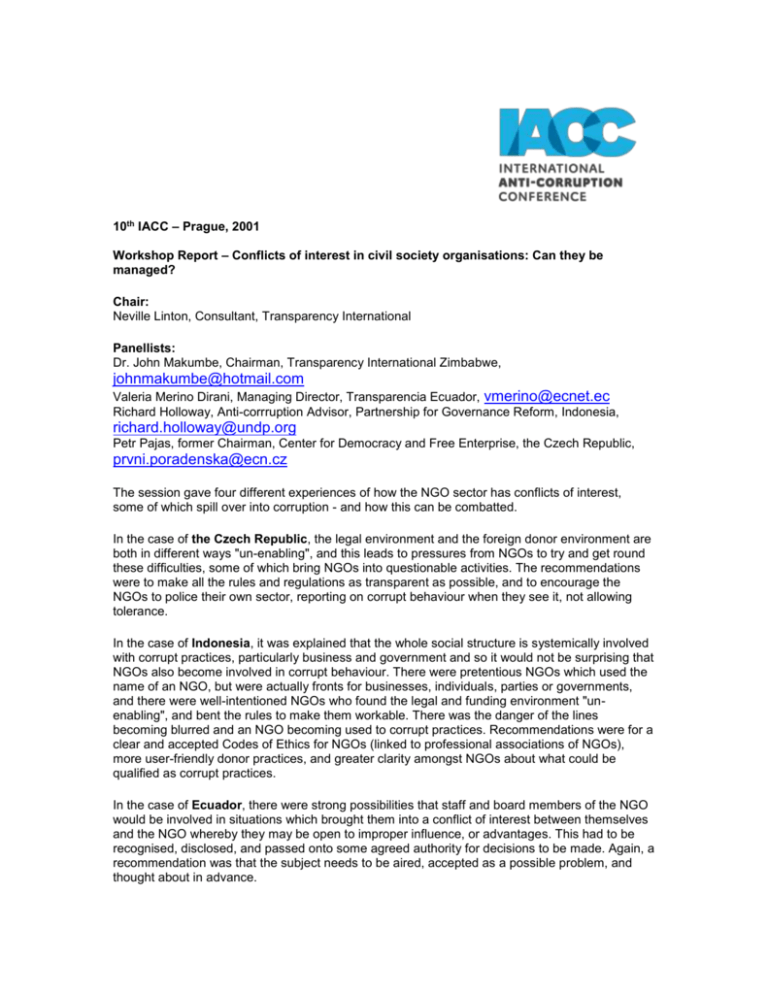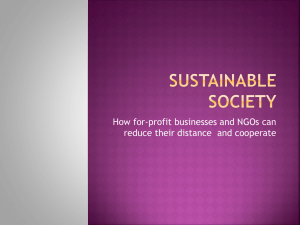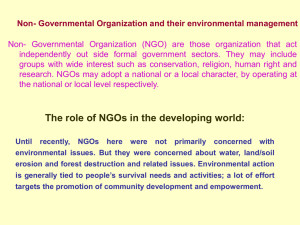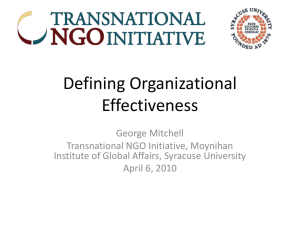Conflicts of interest in civil society organisations
advertisement

10th IACC – Prague, 2001 Workshop Report – Conflicts of interest in civil society organisations: Can they be managed? Chair: Neville Linton, Consultant, Transparency International Panellists: Dr. John Makumbe, Chairman, Transparency International Zimbabwe, johnmakumbe@hotmail.com Valeria Merino Dirani, Managing Director, Transparencia Ecuador, vmerino@ecnet.ec Richard Holloway, Anti-corrruption Advisor, Partnership for Governance Reform, Indonesia, richard.holloway@undp.org Petr Pajas, former Chairman, Center for Democracy and Free Enterprise, the Czech Republic, prvni.poradenska@ecn.cz The session gave four different experiences of how the NGO sector has conflicts of interest, some of which spill over into corruption - and how this can be combatted. In the case of the Czech Republic, the legal environment and the foreign donor environment are both in different ways "un-enabling", and this leads to pressures from NGOs to try and get round these difficulties, some of which bring NGOs into questionable activities. The recommendations were to make all the rules and regulations as transparent as possible, and to encourage the NGOs to police their own sector, reporting on corrupt behaviour when they see it, not allowing tolerance. In the case of Indonesia, it was explained that the whole social structure is systemically involved with corrupt practices, particularly business and government and so it would not be surprising that NGOs also become involved in corrupt behaviour. There were pretentious NGOs which used the name of an NGO, but were actually fronts for businesses, individuals, parties or governments, and there were well-intentioned NGOs who found the legal and funding environment "unenabling", and bent the rules to make them workable. There was the danger of the lines becoming blurred and an NGO becoming used to corrupt practices. Recommendations were for a clear and accepted Codes of Ethics for NGOs (linked to professional associations of NGOs), more user-friendly donor practices, and greater clarity amongst NGOs about what could be qualified as corrupt practices. In the case of Ecuador, there were strong possibilities that staff and board members of the NGO would be involved in situations which brought them into a conflict of interest between themselves and the NGO whereby they may be open to improper influence, or advantages. This had to be recognised, disclosed, and passed onto some agreed authority for decisions to be made. Again, a recommendation was that the subject needs to be aired, accepted as a possible problem, and thought about in advance. In the case of Zimbabwe, it was explained that working for an NGO is no longer inspired by a spirit of voluntarism or sacrifice - it is more likely to be a lucrative generator of personal income and this reflects the corruption in the society around it. The NGOs are not accountable to their clients or target groups, and are often taken over by pretenders who use them as vehicles for organisational or personal advancement. The recommendations again were to bring the issues out into the public domain, encourage reporting of corrupt practices, and more generally to try and build a greater public awareness of the benefits of integrity in society as a whole. Main Themes Covered 1. 2. 3. 4. Conflicts of interest in NGOs Corrupt practices in NGOs The difficult legal environment and its tendency to encourage corruption The difficult and often unhelpful donor funding environment and its tendency to encourage corner cutting which may lead to corruption 5. The corrupt nature of much public behaviour which influences NGOs as well Main Conclusions 1. NGOs need to recognize conflicts of interest and corruption as real and likely problems in the NGO sector, not to ignore them as being the problem of others, and work on ways to deal with such problems. 2. NGOs need to set out clear standards and ethics for themselves and for their sector which will guide people forced with possibly questionable decisions and practices. 3. NGOs need to push for an enabling (rather than "un-enabling") legal and external donor funding environment. 4. NGOs need to encourage people within their own ranks, and outsiders to be whistleblowers in cases of NGO corruption or conflicts of interest, so that it will become clear that corruption will not be tolerated.









